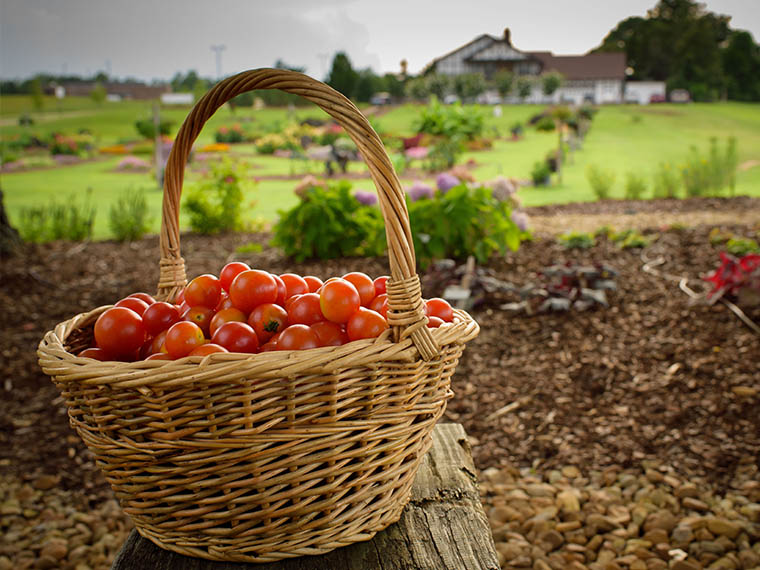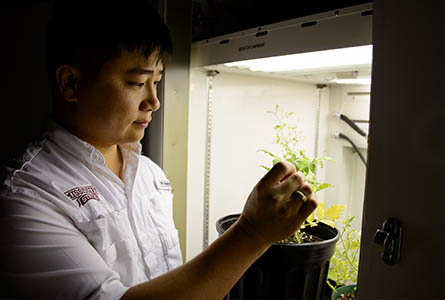The information presented on this page may be dated. It may refer to situations which have changed or people who are no longer affiliated with the university. It is archived as part of Mississippi State University's history.
The most common garden vegetable is also a staple in research laboratories at Mississippi State. From herbicide tolerance to gene modification, tomatoes are being studied to help farmers grow the popular fruit with fewer losses or injuries to the plants.
Dr. Sorina Popescu, assistant professor in biochemistry, molecular biology, entomology and plant pathology, is working to understand how tomato plants respond to pathogens at the molecular level, and editing the plants using CRISPR (clustered regularly interspaced short palindromic repeats) technology.
Popescu explained that the technology allows her to silence a gene expression or make it louder, which affects the plant's response. The technique is promising, she said, because you don't bring anything new into the plant or take anything away.
"You only change what is already there," she said. "That's happening in nature anyway-plants evolve and become more sensitive because gene expression levels may go up or down. It is an alternative to genetically modifying plants."
The changes made using CRISPR technology do not fall under the current definition of genetically modified organisms. Popescu added, though, the jury is still out on how to label these altered foods.
The pathogen Popescu is studying is called Pseudomonas syringae. It can easily wipe out an entire tomato crop if it infects the garden. Many labs across the U.S. and abroad are working with this pathogen because the losses from it are so significant, but also because it can be used to understand other similar pathogens.
The pathogen causes brown-black leaf spots and specks on green and red fruit. The pathogen causes stunting and yield loss, particularly if young plants are infected.
"What we know about Pseudomonas syringae is that when it infects tomato plants through the leaves, then the stomata, it goes to the intercellular space and injects proteins into the plant cells called effectors," she explained. "These proteins are like little soldiers, going into the plant cells and blocking the immune response of the plant at different levels. We are interested in those interactions."
Most pathogens have effectors that act in very similar ways. By studying tomatoes and Pseudomonas syringae, Popescu believes the findings can be extended to other vegetable crops to make them less susceptible to pathogens.
Even though pathogen resistance in tomatoes is something that has been studied for many years, Popescu doesn't see an end in sight. Much like the reason a new flu shot is required each year to fight the influenza virus, continual work to fight pathogens is required for ever-evolving pathogens.
"On the pathogen's side, as soon as you have a resistant tomato, it will try to overcome the resistance," Popescu said. "It's a continuous battle between fruit and pathogens, with researchers trying to stay ahead of the curve."
Other tomato research happening at Mississippi State, though, may show noticeable improvements in the field more quickly. Dr. Paul Tseng, assistant professor in plant and soil sciences, is working on two research projects to get rid of the weeds growing in tomato crops.
"On a large scale, it's very difficult to pick weeds that are growing in tomatoes," Tseng explained. "Usually the way we grow them is to put plastic and then mulch down to suppress the weeds so that they don't receive enough sunlight to germinate. But even with that, we've been getting weeds punching holes in the plastic and coming up. Tomato growers are able to control the weeds between rows, but not in the rows."
Traditional weed sprays like RoundUp damage most commercial varieties of tomato plants. In fact, herbicide that is sprayed on other commercial crops can drift to tomato plants and cause injuries.
One of Tseng's research projects is to find herbicide-tolerant tomatoes that won't be affected by herbicide drift.
His research started with 120 different varieties of tomatoes. So far, he has found 10 to 20 varieties that are tolerant to different herbicides. These varieties, though, are not necessarily commercially-produced tomatoes, and don't have the agronomic qualities like high yield and large fruit size that growers want.
"Our next plan is to look at the genes for these and develop markers for the stress-tolerant genes," Tseng said. "Once we get those tomato varieties that are tolerant to herbicides, we will crossbreed them with commercial varieties of tomatoes to get the yield and fruit quality, crossed with the stress-tolerant traits."
Tseng is also fighting the weeds directly through the allopathic traits in tomatoes. Allelopathy is the chemical inhibition of one plant by another, due to a release into the environment of substances acting as growth inhibitors. Allopathic tomatoes would release chemicals into the soil that interact with the roots and weeds and kill them.
"There are a lot of studies in allopathic vegetables including watermelons and cucumbers, but not tomatoes," Tseng said. "We are working on that, trying to find what varieties of tomatoes have that production of allelochemicals."
This research started with the same 120 varieties of tomatoes as the herbicide-tolerance research. Once allopathic varieties are identified, Tseng will do the same thing-cross those varieties with commercial cultivars to create a commercial product that has the allopathic traits.
Successfully-bred tomatoes from either of Tseng's studies are four or five years away as he is using conventional breeding techniques that are more acceptable to growers.
Both studies will help growers continue to provide one of summer's favorite fruits: red, ripe tomatoes.


